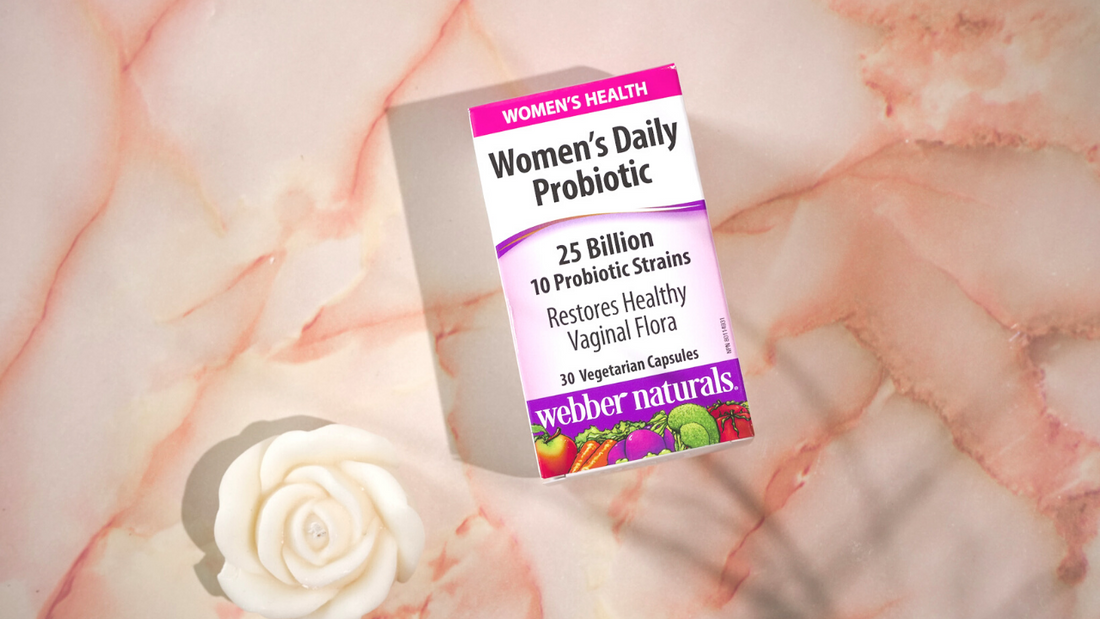Read Time: 5 min | Categories: Body Health | Gut Health
Should You Take a Women’s Probiotic?
Patience Lister, BSc
Share this article
When talking about probiotics, we often focus on gut health −but the benefits of probiotics go so much further! In this blog, you’ll learn about the microbiome and how taking a women’s probiotic can have many health benefits.
Your Microbiome
First, what is the microbiome? Well, your mouth, gut, skin, vagina, and other areas of your bodyare all home to populations of bacteria, yeast, and fungi. Together, these trillions of microorganisms living within and on your body make up your microbiome. And they all depend on one another to stay healthy. [1][2]
Consuming probiotic-rich foods and taking supplements regularly will increase the healthy microbial populations in your gut. This helps prevent the growth of pathogens, including Candida albicans, which is responsible for yeast infections, and Clostridium difficile, which is known to cause diarrhea. [3]

Through a complex communication system, your gut microbiota also indirectly passes on its probiotic benefits to other areas of your body. In addition to signalling your brain and nervous system, your gut microbiome “talks” to the microbiota in your skin, urinary tract, vagina, and other areas of the body by:
- Helping you absorb and synthesize nutrients [4][5]
- Stimulating hormone changes [4][5]
- Altering immune cells [4][5]
- Releasing substances essential for metabolism [4][5]
Probiotic Benefits for Everyone
With so many ways of signalling the body’s systems, probiotics offer benefits for many aspects of health, including your:
But the benefits of probiotics don’t end here!

Probiotic and the Vaginal Microbiome
While everyone stands to gain from taking probiotics, they have some particular benefits for women’s vaginal health.
Just like your gut, your vagina hosts a finely balanced community of microbiota residents. The vaginal microbiome is made up mostly of lactobacilli species. These strains make the lactic acid and other antimicrobial agents responsible for a healthy vaginal pH and protect against undesirable microbes. [7]
Because of its dynamic nature, keeping up a healthy vaginal microbiome can be tricky. It can fluctuate with hormone changes during menstruation, pregnancy, and menopause. It’s also easily thrown off balance by changes in your lifestyle and environment.
Factors such as taking a course of antibiotics, stress, or douching can weaken your vaginal microbiome. [7]

Changes in vaginal microbiota can lead to:
Bacterial Vaginosis
- When the natural lactobacillipopulations in your vaginaare reduced,you are more susceptible to vaginal infection (bacterial vaginosis).
- Bacterial vaginosis affects up to 29% of women. [7]
- Symptoms can include vaginal itching, burning during urination, and grey or odorous discharge. [8]
Yeast Infections
- C. albicans is responsible for up to 90% of vaginal yeast infections, also called candidiasis. [9]
- Although this fungus is a natural part of your overall microbiome, an imbalance in the vagina’s bacterial microbiota can cause an overgrowth of C. albicans. [10]
- Symptoms include itching, irritation, abnormal vaginal discharge, and painful urination.[9]
Urinary Tract Infections
- Urinary tract infections (UTIs) are a common form of bacterial infection that affects up to 60% of women at least once in their lifetime.
- Although typically caused by the intestinal bacteria Escherichia coli (E. coli), changes in vaginal bacteria have been shown to play a key role in UTIs. [11]
- Symptoms include frequent, urgent, and painful urination and cloudy urine. [12]
If you are experiencing symptoms related to these conditions, be sure to talk to your physician. It can also be helpful to take a daily probiotic as part of your recovery and preventative vaginal care.
Probiotic Benefits for Vaginal Health
The good news is that probiotics are vital to support your vaginal health. Regularly getting probiotics through your diet and supplementation can help repopulate the good bacteria and yeast in your vaginal microbiota. Probiotics can help protect against and improve the outcome of vaginal bacterial or fungal infections by: [13][14]
- Maintaining healthy vaginal pH levels
- Encouraging lactobacilli and other “good” microbiota species to thrive
- Discouraging “bad” microorganisms from taking hold
How to Choose the Best Probiotics for Women
Different strains of probiotic bacteria and yeast have different functions in the body. Choosing the best probiotic for your needs will depend on your health concerns, age, and lifestyle.
It is also important that a probiotic helps maintain vaginal microflora for women. Because lactobacilli dominate a healthy vaginal microbiome, these are key strains to look for in a supplement. [1]

Other features to look for in a women’s probiotic include:
- Strains that support gut health and immune function, such as Lactobacillus plantarum [15]
- Bifidobacterium longum or other strains that reduce diarrhea associated with antibiotics commonly prescribed for UTIs [16]
- Added vitamin C or cranberry to support urinary tract health
- A shelf-stable probiotic that can be taken onthe go without refrigeration
- A guaranteed number colony forming units (CFUs) to ensure potency
- Added prebiotics to encourage probiotic growth and activity [17]
For more reasons why you should take a women’s probiotic, check out our Women’s Daily Probiotic and read our other blogs below on gut health and probiotics.
